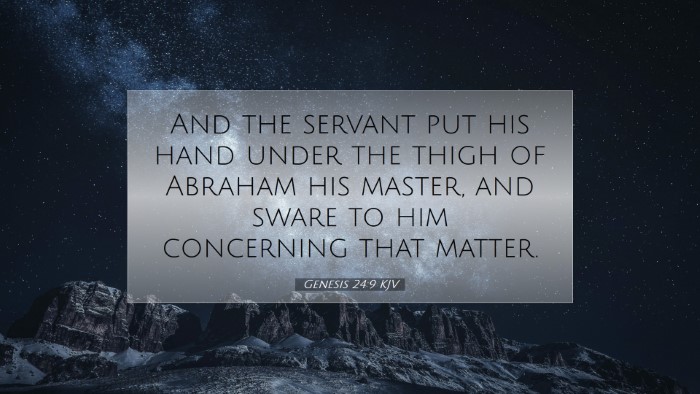Commentary on Genesis 24:9
Genesis 24:9 states: "And the servant put his hand under the thigh of Abraham his master, and sware to him concerning that matter."
Introduction
This verse falls within the narrative of Abraham’s quest for a wife for his son Isaac. The act of swearing an oath in the ancient Near Eastern context is significant and reveals important cultural practices and attitudes that inform our understanding of this text.
Cultural Context
The action of placing a hand under the thigh was a significant and solemn act of making an oath. Matthew Henry notes that this gesture symbolizes the weight of the promise being made. It was an act demonstrating loyalty and sincerity, echoing the serious nature of the commitment being undertaken.
The Role of the Servant
The unnamed servant in this passage assumes a pivotal role in the fulfillment of God’s covenant promises to Abraham. Albert Barnes elaborates that this servant exemplifies the virtues of faithfulness and diligence. His actions are not merely those of a household employee; he acts as a trusted confidant and spiritual agent in carrying out a divine mandate.
- Faithfulness: The servant displays unwavering loyalty as he commits to Abraham’s request.
- Spiritual Responsibility: His oath reflects the gravity of leading the next generation to uphold the vestiges of God's promise.
The Oath as a Reflection of Covenant
In the biblical narrative, oaths are intricately tied to covenants. Adam Clarke interprets the act of swearing an oath as a reflection of the covenantal relationship between God and Abraham. By involving the servant in this tradition, Abraham seeks to ensure that the lineage through Isaac continues in accordance with divine plans.
- Seriousness of Commitment: The act of swearing indicates the solemnity of the promise and the burden of responsibility assumed by the servant.
- Covenantal Continuity: It underscores the importance of adhering to God's covenant by ensuring that the bride for Isaac belongs to the family of faith.
Theological Implications
This brief yet profound verse reveals several theological truths relevant to pastors, theologians, and scholars:
- Authority and Submission: The dynamic between Abraham and the servant highlights the roles of authority and submission within God's plan. The servant's willingness to submit to Abraham’s direction underscores the value of trust in leadership.
- Divine Guidance: The servant’s oath sets the stage for divine providence as he embarks on a journey that will lead to God's selection of Isaac’s wife. It reflects a belief in God’s active participation in human affairs.
Lessons for Modern Believers
Modern readers can derive essential lessons from this passage that echo through centuries:
- Commitment to God’s Purpose: Just as the servant committed to finding a godly spouse for Isaac, believers today are called to actively pursue God's purposes in their lives.
- Integrity in Relationships: The seriousness with which the servant undertook his oath serves as a reminder to believers of the importance of integrity in all commitments—be they personal, professional, or spiritual.
- Trust in Divine Direction: As the servant sought God’s guidance in a matter of great significance, so too should believers seek God’s wisdom in their decision-making processes.
Conclusion
Genesis 24:9 serves as a rich text highlighting themes of faithfulness, divine promise, and the gravity of oaths. Through the lens of public domain commentaries, we appreciate the cultural, theological, and personal implications of this verse. It reminds us of the importance of aligning our lives with God’s purposes and the significance of integrity in our commitments.


